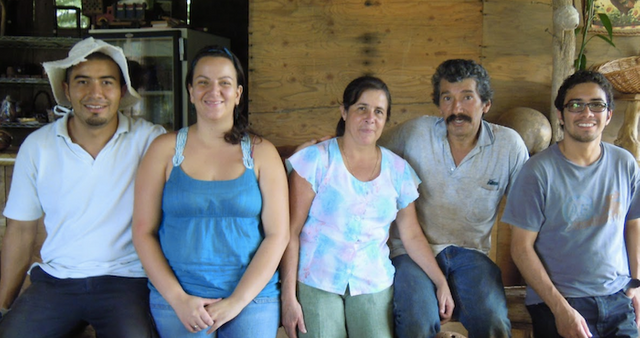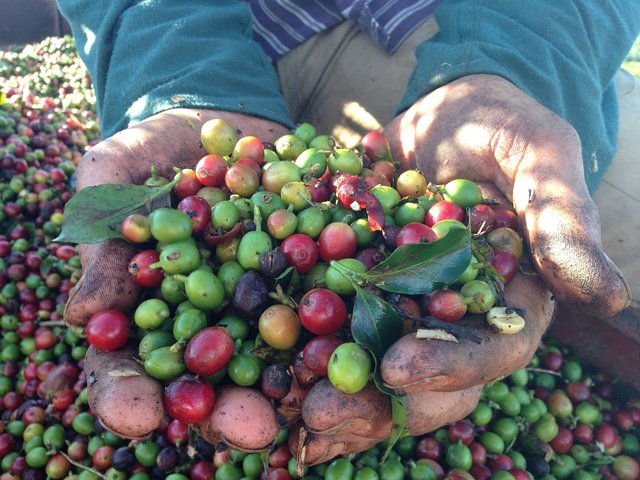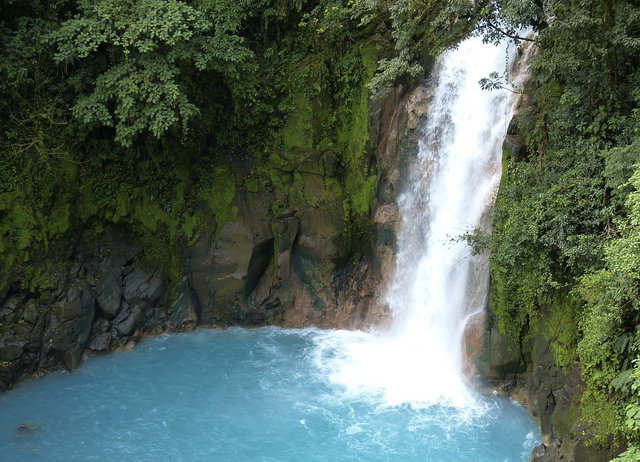5 Reasons To Move to Costa Rica
In 2010, my wife and I quit our jobs and moved to Costa Rica--knowing absolutely no one and having no income whatsoever. I like to say that the decision was made by blindly throwing a dart at a map of the world. Although that's not entirely true, it certainly captures our haphazard style of decision making at the time.
That's why we think we are so lucky to have found a country like Costa Rica. We've since made a family-run organic coffee farm in the country our home for half of the year. In that time, we've come to appreciate five big things Costa Rica has to offer that anyone thinking of moving to the country should know about.
1. They don't hate on--nor are they impressed--with Americans
While the standards of living are well below what most middle class Americans are used to, most people have their most basic needs met. The country also has an effective health care system, college is very cheap, and there's a very strong democratic voting system in place.
That's all nice and good, but I'm only using it to explain this: Ticos (Costa Ricans) aren't impressed with, or angered by, Americans being in their country. My wife has traveled to several locations throughout the world where being an American meant being hounded for money. We've been in others--Europe especially--where we were looked down upon for our nationality.
It was completely refreshing to move somewhere where no one ever genuinely cared about the fact that we were from the States.
2. Community matters in Costa Rica
This isn't just lip service. Let me relate with a story:
During our second year, we took a tour near the Arenal Volcano. Our guide was very personable, probably in his late twenties, and clearly educated. We asked him where he was from. He mentioned a town that was about 30 miles away (maybe an hour driving). He said that he'd never lived so far from his family before, and that he genuinely missed being with them and his friends.
(The family that adopted us)
We've noticed the same thing with the family that owns the farm that we live on. All of their neighbors are family, and they come and go throughout the day. Now entering our seventh year in the country, my wife and I feel like we're part of the community, because most of the community is related to each other. That creates strong social fabric and a safety net that no government could ever provide.
3. Coffee is a pretty great thing to have as your #1 export...and it has nothing to do with a morning pick-me-up
In America, small farms are disappearing quickly, and agriculture in general has become much more industrialized. That has led to a mass migration to the cities, and a slump in rural life.
While San Jose has certainly seen its numbers grow, the situation is different in Costa Rica. A big part of that is because there are over 70,000 families that grow coffee in Costa Rica. Inherently, this means that each and every one of these farms are relatively small.
A big part of this is because coffee grows very well in volcanic soil, and volcanic soil is almost always found in mountainous regions. Given this type of topography, the coffee picking process cannot be mechanized, meaning that it simply wouldn't make sense for large multinational corporations to buy up huge swaths of coffee farms.
While farming coffee hasn't--to the best of our knowledge--ever made a Tico wealthy (especially by American standards), it creates a solid middle-class.
4. There is a lot of land devoted to wildlife
Think about this: 25% of the land in Costa Rica is protected--either as a national park or indigenous reserves. To put that in perspective, that would be like the states of California, Texas, Colorado, Michigan, Minnesota, Utah, and Washington becoming national parks overnight. It's mind-boggling.
What most people don't realize is that these parks are not all beaches and jungles. Costa Rica--for the tiny size that it is--has 12 different micro-climates. There're cloud forests, hot beaches, rain forest, and areas that feel like desert savannahs. Hell, the temperature usually falls ten degrees between the farm where we live and the nearest town, just four miles away.
The bottom line is this: there's no lack of nature to submerse yourself in, and the country has a clear devotion to preservation and conservation.
5. It's affordable
We've heard from other ex-pats that the country is much more expensive now that it was just ten years ago. That being said, it's still very affordable. The general rule to live by is this: products cost just as much as they would in the U.S., but services are much cheaper.
The explanation is pretty simple: most of the products come from outside the country. Combining shipping costs with taxes causes these goods to be very expensive (don't even get me started on the prices and taxes on cars!).
But services of any type are ridiculously cheap. We needed to have a backhoe come to clear land for our house on the coffee farm last year. It ended up being a six hour job, and I was prepared for it to cost as much as $2,000.
When I went up to the driver to ask what the rate was, he said it was $32 per hour--for a grand total of about $200. Ninety percent less than I was prepared for! The same is true for taxis, massages, labor--anything that doesn't involve an exchange of goods.
Of course, like any other country, the people aren't mono-chromatic. There are areas that aren't so friendly, others that are crazy expensive; some are terribly polluted, while certain towns have no sense of community at all.
But after living and travelling in the country for six years, I'm confident that most people visiting the country, and considering a move, will find these things to be true.
Photo Credits: Pixabay




From a logistics standpoint, what does it take, time and money-wise, to get yourself set up in a place like Costa Rica?
For example, a lot of people in the U.S. telecommute nowadays. If you have the kind of job where all you need is a fast and stable internet connection, but you can do it from anywhere, what's it take to get yourself relocated, buy a >1000 square foot abode somewhere with 99% reliable power, internet, climate control, maybe set up a home gym in your extra room, and start living your life as an ex-pat?
I earn a living telecommuting. The cost varies greatly depending on what you want. We lived comfortably fit many years in a place with tent of 400 dollars.
Let's say someone's a spoiled American suburbanite living in some cookie-cutter upper-middle-class 4+bedroom home in the 'burbs, paying a bazillion dollars in property taxes so that his kid only ends up in school with other upper middle class white and Asian kids whose parents can afford to live in his neighborhood. And now he's spent all of his money keeping up with the Jones' buying crap from Pottery Barn and Bed Bath and Beyond that nobody needs but his wife likes, and after 20 years of mediocrity, his kids are off to college and he wants to do something adventurous by retiring somewhere exotic where his American dollars go farther.
So this guy that you definitely don't want as your neighbor, because he wouldn't be down with living in a tent growing coffee and would probably piss you off daily with his entitlement, would probably want a 2 (or more) bedroom house or condo, in a location with completely reliable electricity and internet, with a bad-ass enough kitchen to do some awesome cooking, either enough space for a home gym or close enough to walk to a public gym, and within walking (or commuting) distance of whatever the Costa Rican Wal-Mart equivalent is, so he can buy whatever he can't find locally.
How much money is Joe Suburbanite going to spend buying a residence and getting set up? And what do his monthly expenses look like? And what things is he going to have to get used to and adjust about his lifestyle?
@archwinger- Ha, I love the honesty. Let's see if I can help you. Let's do the easy stuff first: the Wal-Mart equivalent is either a Pali (owned by Wal-Mart) or PriceMart (like Costco).
Beyond that, there are lots of opportunities for you. I'd venture to say that most people that you're describing end up in one of two places: the outer suburbs of San Jose (Heredia, Santa Ana, Escazu) or at one of the nicer beach towns.
I honestly have no idea how much a 2 or more bedroom house goes for in those parts, because they can vary so widely. If lots of ex-pats are in the area, prices get driven up quickly. That being said, I've seen many nice homes like the ones you describe that sell for between $200K and $300K in the town nearest to where I am. Not sure if that's cheap or expensive, based on where you're moving from.
As far as water and electricity goes, that also varies greatly. I'd say that in our small town, it is functional 95% of the time--with occasional water outages during the end of the dry season. My guess is that this would be less of an issue in the suburbs, but possibly more of an issue near the beaches.
For the Internet, the country's come a LONG way in the past five years, since the market became deregulated. It's just as good as North America, IMHO. It costs about $50 per month where we are. Most goods (namely, food) are about the same price as in the States, though if you go to farmer's markets you can get lots of coffee and fresh fruit for much less.
Beyond the costs of a house, the biggest purchase to worry about is a car. The country's taxes on them are astronomical.
Also, climate control can get very expensive, but isn't that necessary if you don't live on the beach
Love the story, and now I want to move there! What a brave couple you must be.
@whatsup-
Many thanks. I'd say equal parts brave and lucky. If you live in the States, tickets on Southwest are very reasonable!
Sounds like a good place for a poor person to retire. Live off social security.
Many people from North America do exactly that